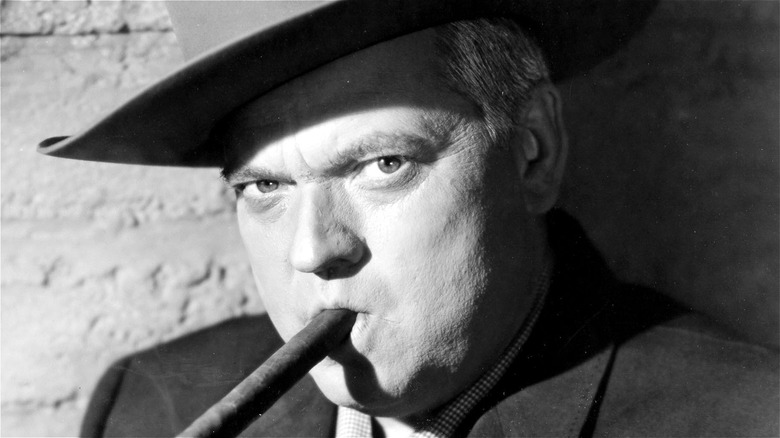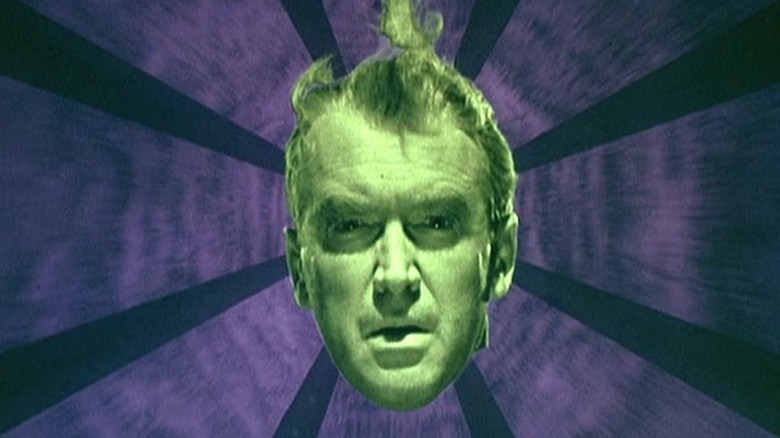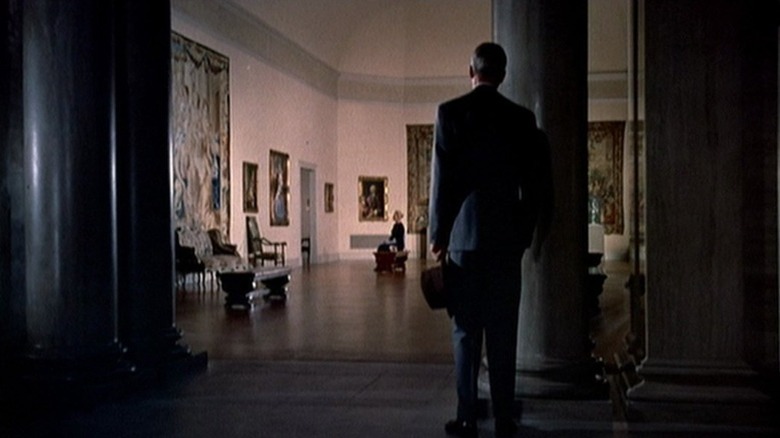The Worst Alfred Hitchcock Movie According To Orson Welles
One of the tacit rules of Hollywood, and of the world's film industries at large, is that it's not a very good practice to badmouth your peers. After all, no matter how much you dislike a certain effort and fancy yourself superior to it, it's not like you're the director of "Citizen Kane" yourself; everybody who sets out to make movies is on the same boat, doing the best they can, equally susceptible to failure and imperfection.
Of course, when it came to the person who did direct "Citizen Kane," they felt as authoritative on the subject of other movies and directors as you might expect. Orson Welles was as famous for his takedowns of fellow master filmmakers as for having helmed the commonplace pick for best film of all time. The targets of his reckless, iconoclastic eloquence ran the gamut from Charlie Chaplin to Michelangelo Antonioni, Jean-Luc Godard, and Sergei Eisenstein (via Open Culture). But there is one great director for whom Welles' words were particularly harsh: the Master of Suspense himself, Alfred Hitchcock. And Welles' criticism of Hitchcock is all the more jarring when you consider the movie it's aimed at — precisely the one that vies with "Citizen Kane" for the all-time critical crown.
Orson Welles absolutely hated Vertigo
Most of the "Orson Welles trashing other directors" quotes that float about on the internet from time to time come from the same source: The book "My Lunches With Orson," edited by Peter Biskind, which puts to paper a series of lengthy taped conversations between Welles and his filmmaker friend Henry Jaglom. In one such conversation, Welles famously shares his opinion on Alfred Hitchcock, claiming he "never understood the cult" of the celebrated director.
Welles' skepticism was particularly reserved for Hitchcock's "peak years" of 1954-64, in which, having moved stateside and established himself as a legend with Hollywood hits like "Shadow of a Doubt" — which Welles considered his only good American movie — the British filmmaker adopted color, sprang for bigger budgets and stars, and made the most famous and celebrated movies of his career: "Psycho," "North by Northwest," and "The Birds." Welles found all of those movies to be "lit like television shows" and marred by "egotism and laziness." At that point in the book, Welles tears lengthily into "Rear Window," calling it "stupid" and Jimmy Stewart's performance "really bad" among other insults.
But then he somehow managed to be even more casually devastating in his dismissal of the other major Hitchcock-Stewart collaboration: "'Vertigo.' That's worse," he simply says. Not even any further elaboration on why, exactly, he thinks the 1958 psychosexual grand masterpiece is so bad — just cold dismissal. Orson Welles didn't play.
Despite this famous detractor, Vertigo is often considered the best movie of all time
Here's where Orson Welles, Alfred Hitchcock, "Citizen Kane," and "Vertigo" dovetail, and things get really interesting. One of the, if not the main reason Welles' debut film is synonymous with "best movie ever" in the common cultural lexicon is that it was named as such for decades in the Sight & Sound Poll of the Greatest Films of All Time — a survey of hundreds of academics, critics and journalists around the world made by the eponymous British magazine, which American film critic-of-record Roger Ebert described as "by far the most respected of the countless polls of great movies — the only one most serious movie people take seriously."
In its first edition, in 1952, when "Citizen Kane" was still a fairly recent movie, the Sight & Sound poll crowned Vittorio de Sica's "Bicycle Thieves" as the best movie of all time. But, starting in 1962, every edition of the decennial ranking would go on to have "Citizen Kane" at the top; this held true in 1972, 1982, 1992, and 2002, contributing to the widespread perception of the movie as a consensus pick for "best ever." It wasn't until the most recent edition of the Sight & Sound poll, in 2012, that "Citizen Kane" would finally be dethroned... by "Vertigo."
Welles, who lived long enough to see his work become a celebrated masterpiece, but not quite long enough to witness "Vertigo'"s late-century reappraisal from freaky little sidequest to crowning achievement of Hitchcock's career (via Yardbarker), would certainly be flummoxed.


